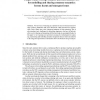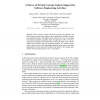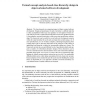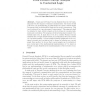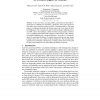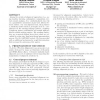ICFCA
2005
Springer
13 years 9 months ago
2005
Springer
A key difficulty in the maintenance and evolution of complex software systems is to recognize and understand the implicit dependencies that define contracts that must be respecte...
ICCS
2005
Springer
13 years 9 months ago
2005
Springer
Abstract. Morphisms constitute a general tool for modelling complex relationships between mathematical objects in a disciplined fashion. In Formal Concept Analysis (FCA), morphisms...
ICCS
2005
Springer
13 years 9 months ago
2005
Springer
Abstract. We have been witnessing an explosion of user involvement in knowledge creation, publication and access both from within and between organisations. This is partly due to t...
ICCS
2005
Springer
13 years 9 months ago
2005
Springer
Abstract. Minimal generators (mingens) of concept intents are valuable elements of the Formal Concept Analysis (FCA) landscape, which are widely used in the database field, for da...
FCA
2005
Springer
13 years 10 months ago
2005
Springer
Formal Concept Analysis (FCA) has typically been applied in the field of software engineering to support software maintenance and object-oriented class identification tasks. This...
FCA
2005
Springer
13 years 10 months ago
2005
Springer
The class hierarchy is an important aspect of object-oriented software development. Design and maintenance of such a hierarchy is a difficult task that is often accomplished witho...
FCA
2005
Springer
13 years 10 months ago
2005
Springer
Abstract. A main goal of Formal Concept Analysis from its very beginning has been the support of rational communication. The source of this goal lies in our understanding of mathem...
AIME
2005
Springer
13 years 10 months ago
2005
Springer
Abstract. In most case-based reasoning (CBR) systems there has been little research done on validating new knowledge, specifically on how previous knowledge differs from current k...
KCAP
2005
ACM
13 years 10 months ago
2005
ACM
Among the variety of alignment approaches (e.g., using machine learning, subsumption computation, formal concept analysis, etc.) similarity-based ones rely on a quantitative asses...
KBSE
2005
IEEE
13 years 10 months ago
2005
IEEE
Traits are basically mixins or interfaces but with method bodies. In languages that support traits, classes are composed out of traits. There are two main advantages with traits. ...

